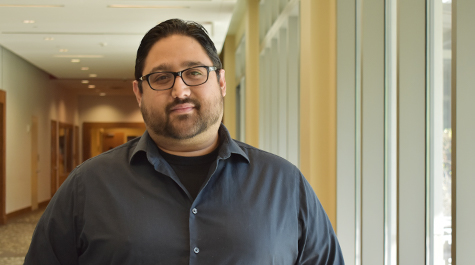New research grant will support tobacco intervention in Latinx communities
William & Mary faculty member Daniel Gutierrez, assistant professor in counselor education, and his colleagues have received a multi-year grant from the Virginia Foundation for Healthy Youth for the purpose of developing a culturally appropriate tobacco prevention program for Latinx youth in the Richmond area. The project, “Culturally Enhancing a Motivational Interviewing Intervention for Latinx Adolescents,” aims to provide the Latinx community in Richmond with access to culturally enhanced, Spanish-language, evidence-based tobacco prevention interventions, and to evaluate the impact of the intervention.
The program will be built around motivational interviewing, the same model used in the New Leaf Clinic, the addictions and recovery clinic staffed by graduate counseling students at William & Mary.
“We are interested in determining the effectiveness of a culturally enhanced, evidence-based motivational interviewing intervention on adolescent tobacco use outcomes,” explained principal investigator Rosalie Corona, professor and director of clinical training in the department of psychology at Virginia Commonwealth University (VCU) in Richmond. Corona’s previous research has established that the Latinx community in Richmond desires bilingual mental health information, as well as information about how to maintain the strength of Latinx families, address youth behavior problems at home and at school, and address drug and alcohol use problems. Corona and her team found that there is a lack of Spanish-language or bilingual materials available for the Latinx population. Her interest in adapting and testing evidence-based models underlies the current funded grant proposal.
“We are also exploring whether culturally enhancing the intervention improves Latinx adolescents’ substance use outcomes above and beyond the evidence-based intervention that is not culturally-enhanced,” she said. “This project will also provide us with the opportunity to linguistically translate the Virginia Foundation for Healthy Youth's module on the Dangers of Other Tobacco Products so that the foundation can make a Spanish-language version available on its website.”
Corona’s research proposal matched well with the research Gutierrez had been pursuing at UNC-Charlotte, prior to his arrival at William & Mary last year.
“I’d been doing Latinx research already,” he explained. “When I was in Charlotte, I worked on Latinx mental health and when I came to William & Mary, it was my goal to continue with participatory research.” He quickly became aware of the work that faculty at VCU had been doing to develop culturally appropriate materials for the Latinx community in Richmond.
For example, Gutierrez explained, “One of the concepts we know is important in the Latinx community is the idea of familismo, that family is first. In Charlotte, we found that you couldn’t bring people in for individual care, but you could bring them in for family care. Family becomes a motivational component.”
Familismo is one of many cultural factors which may result in altering the way interventions are implemented in Latinx communities, beyond simply translating materials into Spanish.
“In general, Latino youth start younger with tobacco products, and they use tobacco longer,” said Gutierrez, adding that this is of increasing concern as alternative tobacco products such as e-cigarettes enter the market. Additionally, he says, there is some data to suggest that Latinx youth who use tobacco are also more likely to use other substances later on. Finally, Latinx populations have significant health disparities and seek care much later in an illness, further complicating the negative health impact of tobacco.
The goal of the research is to develop materials and strategies that are appropriate and effective for the Latinx community in Richmond, with a family focus.
“Interventions are three to four times more effective if they have been evaluated and are culturally appropriate,” added Gutierrez.
The William & Mary and VCU research team is also partnering with Virginia Tech and Richmond’s Sacred Heart Center to implement the work of the grant. The team hopes that this research will yield a model that can be used in other Latinx communities around the country.
